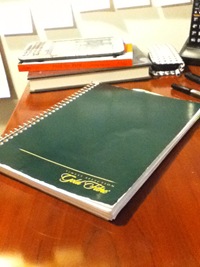Currently listening to: Give Me A Sign by Breaking Benjamin
Alexandra Bracken (Brightly Woven) said once in her blog that she won't let herself skip ahead to the "good" scenes—the ones that she's dying to write. She'll force herself to build up her story properly, and savor the tension like the reader must do. It provides some motivation to make every scene interesting in its own right.
But you've got to admit…some moments you just want to skip ahead for.
I don't consider myself one of those writers that will write ahead, but I don't really think of myself as a  chronological writer, either. This goes along heavily with the fact that if I don't write it down, I won't remember it. Period. That's what The Notebook is for. (No, I am not Nicholas Sparks moonlighting as an aspiring teen writer. Calm down.) But if something doesn't get written down—a scene, some reams of dialogue—its awesomeness will be lost forever in the depths of my imagination and never see the light of day again.
chronological writer, either. This goes along heavily with the fact that if I don't write it down, I won't remember it. Period. That's what The Notebook is for. (No, I am not Nicholas Sparks moonlighting as an aspiring teen writer. Calm down.) But if something doesn't get written down—a scene, some reams of dialogue—its awesomeness will be lost forever in the depths of my imagination and never see the light of day again.
This seriously makes me envy authors that follow the path of Patricia Briggs (Moon Called). She said in an interview once that she almost never writes down her story ideas. She keeps it all in her head. And if she forgets something, she knows she'll just think of something better.
Such an envious talent.
So which am I really? The chronological writer like Alexandra Bracken who forces herself to write in the proper order so as to appreciate the good scenes better? Or the skip-ahead writer who goes right for the good stuff and fills the Other Stuff in later?
Most times I don't write down the whole scene, which is why I don't consider myself a skip-ahead writer. But I will go ahead and write out the really good moments as not to forget the exact words that I want.
Hmm…am I just outlining? What the heck AM I doing?
Let's put those questions aside for now and simply cast them away into the worldly abyss for later examination.
You know how hard it is not to unload all the good stuff in the beginning of your story? I'm in the first three chapters and I sometimes stop myself, backspace furiously and say to my empty room, "No, I can't write that because it's too much too early!" And then I sink into a pitiful funk because, like a child, I want it. Now.
My character is totally awesome with her telepathy and fighting and general awesomeness, and my secondary character is witty and hilarious, so it's hard not to unload all those really funny lines up front because then I'm just digging myself a hole. Like, if all my secondary character's witty lines come in the beginning, the middle and end will suck, or become lackluster because the jokes aren't as good.
So this premature unloading also interferes with character development. Especially in a series. I think it's hard, once you figure out who your character is going to become, to write them as ignorant and childlike compared to the wise, kickass adult they'll later become. That subtle shift in personalities is hard to write. I think it's easier for seat- of-the-pants writers who have no idea what's going to happen so they won't be influenced by prior knowledge. People who outline know that the shift is coming and in what form, so they have to make sure that they aren't exposing it prematurely.
of-the-pants writers who have no idea what's going to happen so they won't be influenced by prior knowledge. People who outline know that the shift is coming and in what form, so they have to make sure that they aren't exposing it prematurely.
J.K. Rowling couldn't have had Harry acting like the Chosen One at age eleven, now, could she?
*sigh*
Let's go briefly back to my notebook—it's awesome, isn't it? I get this particular kind of notebook from my dad who has to order them in bulk through his job. He gets roughly fifty at a time and so I've siphoned a few of them off of him from time to time whenever I start a new story. (I hate putting multiple stories in one notebook. Makes my skin itch.)
They have this great feature: the page is divided into what they call "Project Planning Notes" and "Project Action Notes". Basically, a neat little sidebar that lets me add additional notes as I think of them instead of having to cram into tiny little places in the text itself. It's absolutely wonderful for me. It's also smaller than an 8.5" by 11" notebook—I can fit it much easier into my backpack and purse.